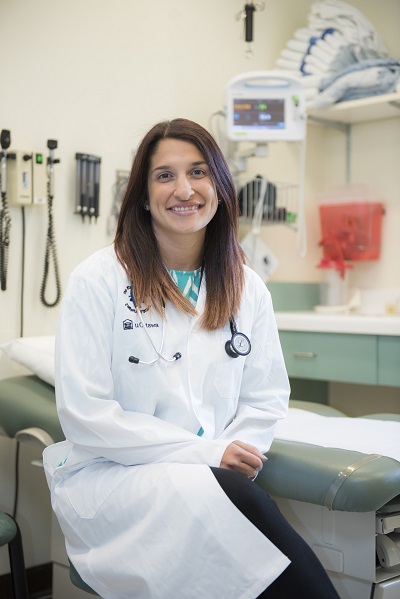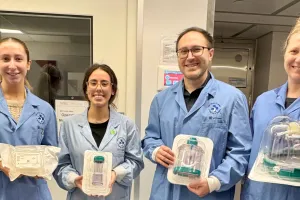One small step for blood cancer patients, one giant step for Canadian cancer patients of all stripes
 "We want to build up the research infrastructure, to make this research available to Canadians," says Dr. Kekre. "Canadian cancer patients shouldn't have to wait for the research to be done elsewhere, but be able to participate in innovative clinical trials here at home."Ostensibly, it's a clinical trial of an immunotherapy for blood cancer patients with specific kinds of leukemia or lymphoma, for whom other treatments have not been successful. A better result could mean the difference between life and death for these patients; the importance of this trial for them cannot be overstated.
"We want to build up the research infrastructure, to make this research available to Canadians," says Dr. Kekre. "Canadian cancer patients shouldn't have to wait for the research to be done elsewhere, but be able to participate in innovative clinical trials here at home."Ostensibly, it's a clinical trial of an immunotherapy for blood cancer patients with specific kinds of leukemia or lymphoma, for whom other treatments have not been successful. A better result could mean the difference between life and death for these patients; the importance of this trial for them cannot be overstated.
But the implications of the Canadian-Led Immunotherapies in Cancer (CLIC-01) clinical trial go far beyond this one trial, says lead investigator Dr. Natasha Kekre, a hematologist and associate scientist at The Ottawa Hospital and assistant professor at the University of Ottawa. It is the first trial that uses Canadian-made CAR T cells and, if successful, it means that further research innovations will be available to Canadian patients.
CAR T cells, or chimeric antigen receptor modified T-cells, are not simple, off-the-shelf products. They are, says Dr. Kekre, much more complex than drugs. They work by enhancing the body's own immune system to better attack cancer.
The cells are made from patients' own T-cells, a type of immune system cell. The T-cells are extracted from their blood, genetically modified in the lab to be more active, and then re-administered to the patients. These "souped-up" immune cells are then better able to attack and kill cancer cells.
CAR T cells have shown tremendous promise in treating cancers that haven't responded to other treatments. To date, two CAR T cell therapies are on the market, targeting certain types of B-cell lymphoma and acute lymphoblastic leukemia. Both of these treatments have been approved for use in Canada.
But, says Dr. Kekre, Canadians don't have the same ability to participate in clinical trials that are testing new uses of CAR T cells because we have very limited domestic infrastructure for manufacturing the cells. That, she says, is the key motivation for this trial.
"We want to build up the research infrastructure, to make this research available to Canadians," she says. "Canadian cancer patients shouldn't have to wait for the research to be done elsewhere, but be able to participate in innovative clinical trials here at home."
With CLIC-01, Canada now has the ability to manufacture CAR T cells using patients' own T-cells. Two previous studies, both of which Dr. Kekre was involved in, built the manufacturing capacity for CAR T cells and examined the clinical, social and economic impacts of having this capacity available in Canada. The end goal of the latter project was to design a feasible, safe, and effective clinical trial protocol - the protocol that has since become CLIC-01.
Dr. Kekre is uniquely suited to lead this trial. Her background is in the highly technical areas of stem cell transplantation and immunotherapy. But she also possesses a master's degree in public health from Harvard University, where a major focus was learning the skills needed to execute well designed clinical trials.
CLIC-01 is underway now. The first phase of the trial, with about 20 patients, will establish the safety of the home-grown CAR T cells. The second phase, which will involve another 40 patients, will then look at their efficacy in fighting leukemia and lymphoma. The trial is currently open and enrolling participants at The Ottawa Hospital and in Vancouver.
And after that? It's anybody's guess, but the potential is huge. The most likely avenue, says Dr. Kekre, is extending CAR T therapy to other forms of cancer, either alone or as part of a combination therapy, to stop the cancer cells from repelling an immune system attack into the game, as well as to supplement the CAR T cell-fuelled immune attack.
CLIC-01 is critically important for the patients involved. But it is also being watched closely for its impact on future research that will be carried out in Canada, for the benefit of Canadian patients. A giant step in cancer treatment, indeed.
About the Canadian-Led Immunotherapies in Cancer (CLIC) research program
The CLIC research program, established in 2016, brings researchers, clinicians and patients from across Canada together to build Canadian expertise and capacity for innovation in the promising field of cellular immunotherapy for cancer, including CAR-T therapy. The first CLIC clinical trial launched in 2019 at The Ottawa Hospital and at BC Cancer, with support from BioCanRx, BC Cancer, The Ottawa Hospital Foundation and the Ontario Institute for Cancer Research. Core facilities and resources supporting CLIC include The Ottawa Hospital's Biotherapeutics Manufacturing Centre, BC Cancer's Conconi Family Immunotherapy Lab, the Ottawa Methods Centre and the Blueprint Translational Research Group. CLIC team investigators include Drs. Natasha Kekre, Harold Atkins, John Bell, Kevin Hay, Rob Holt, Brad Nelson, John Webb, Manoj Lalu, Kednapa Thavorn, Dean Fergusson and Justin Presseau.
This story is adapted from a story written by Heather Blumenthal and published by BioCanRx.
Core Facilities:
Learn more about:
The Ottawa Hospital is a leading academic health, research and learning hospital proudly affiliated with the University of Ottawa and supported by The Ottawa Hospital Foundation.


